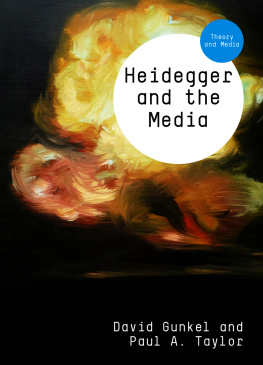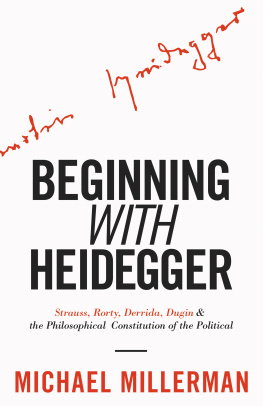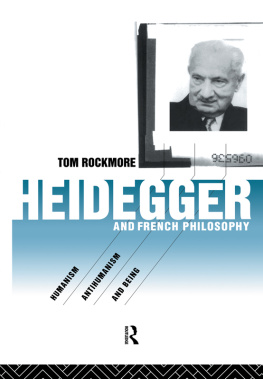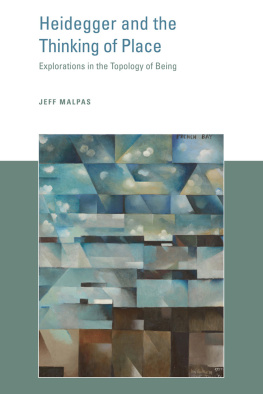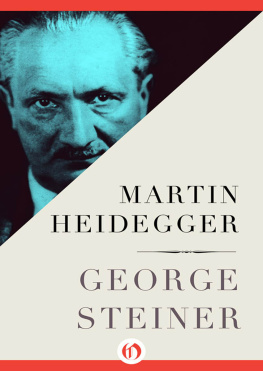Gunkel David - Heidegger and the Media
Here you can read online Gunkel David - Heidegger and the Media full text of the book (entire story) in english for free. Download pdf and epub, get meaning, cover and reviews about this ebook. City: Oxford, year: 2014, publisher: Polity;Wiley, genre: Romance novel. Description of the work, (preface) as well as reviews are available. Best literature library LitArk.com created for fans of good reading and offers a wide selection of genres:
Romance novel
Science fiction
Adventure
Detective
Science
History
Home and family
Prose
Art
Politics
Computer
Non-fiction
Religion
Business
Children
Humor
Choose a favorite category and find really read worthwhile books. Enjoy immersion in the world of imagination, feel the emotions of the characters or learn something new for yourself, make an fascinating discovery.
- Book:Heidegger and the Media
- Author:
- Publisher:Polity;Wiley
- Genre:
- Year:2014
- City:Oxford
- Rating:5 / 5
- Favourites:Add to favourites
- Your mark:
- 100
- 1
- 2
- 3
- 4
- 5
Heidegger and the Media: summary, description and annotation
We offer to read an annotation, description, summary or preface (depends on what the author of the book "Heidegger and the Media" wrote himself). If you haven't found the necessary information about the book — write in the comments, we will try to find it.
Heidegger and the Media — read online for free the complete book (whole text) full work
Below is the text of the book, divided by pages. System saving the place of the last page read, allows you to conveniently read the book "Heidegger and the Media" online for free, without having to search again every time where you left off. Put a bookmark, and you can go to the page where you finished reading at any time.
Font size:
Interval:
Bookmark:
Theory and the Media
John Armitage, Virilio and the Media
David J. Gunkel and Paul A. Taylor, Heidegger and the Media
Philip Howard, Castells and the Media
Paul A. Taylor, iek and the Media
Geoffrey Winthrop-Young, Kittler and the Media
Cambridge CB2 1UR, UK
350 Main Street
Malden, MA 02148, USA
I am a philosopher, not a scientist, and we philosophers are better at questions than answers. I havent begun by insulting myself and my discipline, in spite of first appearances. Finding better questions to ask, and breaking old habits and traditions of asking, is a very difficult part of the grand human project of understanding ourselves and our world.
Dennett 1996: vii
Philosophy, unlike the empirical sciences or other investigative activities, is not necessarily concerned with answers. Like the American philosopher Daniel Dennett, Heidegger is not interested in providing solutions to existing questions and debates but is dedicated to re-examining all those questions that have typically been asked in a relatively uncritical fashion. Heidegger highlights the predominantly unacknowledged ways in which the very typicality of our conventional modes of inquiry already over-determine what can be asked about, what evidence will count as appropriate and what outcomes might be possible.
We do not deny that this makes reading Heidegger challenging, if not frustrating, in a manner for which the contemporary reader may be ill prepared. We live in an age in which questions generally demand immediate answers, and it is often considered bad form to respond to a question with another question. But this is precisely what Heidegger does and, in our view, this is what represents authentic philosophical endeavour a much-needed form of inquiry that has increasingly been siphoned off by self-styled social sciences in which the fetishization of methodology frequently acts as a poor alibi for genuine thought.
In keeping with this philosophical commitment to critical inquiry, however, a question immediately arises concerning Heidegger and his infamous entanglement with Nazism. According to Miguel de Beistegui (2005: 155), no aspect of Heideggers life and work is more controversial than his engagement in favour of National Socialism, and his tenure as the first Nazi rector of the University of Freiburg from May 1933 to April 1934. Although Heidegger only occupied the position of rector for twelve months, he remained a member of the party through the end of the war and was officially classified a Nazi Mitlufer, or fellow traveller, in March 1949 by the State Commission for Political Purification as part of the post-war de-Nazification process. Heidegger presented his own account of this difficult period in an interview with the German magazine Der Spiegel published posthumously in 1976 (a precondition for his agreement to talk). Despite his rationale, most scholars find Heideggers public explanations to be woefully inadequate and persistently unapologetic leading to more questions than answers. And one of those questions that still needs to be addressed is what, if anything, can or should be salvaged from Heideggers work?
Our belief that Heideggers thinking still justifies persevering with rests upon two central points:
The first justification falls outside the remit of a book about media technology, but the second relates to Heideggers unique perspective concerning the concept of essence as it relates to our contemporary mediated environment, where (foreshadowing Marshall McLuhans famous adage The medium is the message) we often miss the fundamental social effects of media due to our tendency to be distracted by the relatively superficial significance of their content when compared to their form.
In fact, this concern is clearly evident in one of the very passages relating to the Holocaust that Heideggers critics put forward as proof that he should be viewed as an intellectual persona non grata. In a 1949 lecture entitled Das Gestell (Enframing), Heidegger described how agriculture is now a mechanized food industry, in essence the same as the production of corpses in the gas chambers and extermination camps, the same thing as the blockading and starving of countries, the same thing as the production of hydrogen bombs (BFL: 27). The equivalences Heidegger asserts here led to such representative criticisms as Davidsons (1989: 424) observation that when one encounters Heideggers 1949 pronouncement, one cannot but be staggered by his inability call it metaphysical inability to acknowledge the everyday fate of bodies and souls, as if the bureaucratized burning of selected human beings were not all that different from the threat to humanity posed in the organization of the food industry by the forces of technology. Using the phrase were not all that different, Davidson fundamentally misses Heideggers central philosophical point. By concentrating solely on the expression the same thing as, Davidson thereby ignores the crucial qualification contained in the immediately preceding phrase in essence. It is with this particular concept that Heideggers work, despite, we repeat, the eminently understandable reservations one might have about the man himself, provides profoundly important insights into the social impact of technology, and, in particular, media technology.
Font size:
Interval:
Bookmark:
Similar books «Heidegger and the Media»
Look at similar books to Heidegger and the Media. We have selected literature similar in name and meaning in the hope of providing readers with more options to find new, interesting, not yet read works.
Discussion, reviews of the book Heidegger and the Media and just readers' own opinions. Leave your comments, write what you think about the work, its meaning or the main characters. Specify what exactly you liked and what you didn't like, and why you think so.

